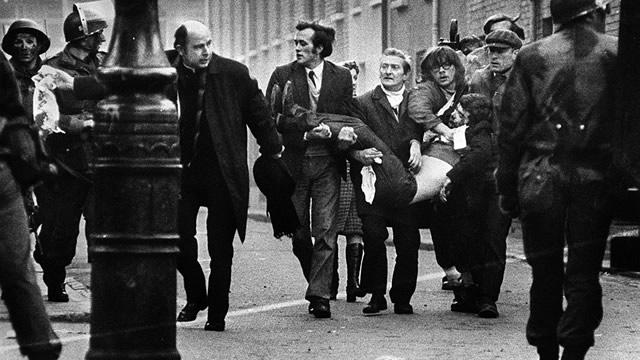
Bloody Sunday 1972
Brian G. McCartney QC exposing the cowardice of Soldier 039 of Guinness Force, HQ Platoon of Support Company in firing a rubber bullet at a female within the sanctity of her own home in Kells Walk in the Bogside, in circumstances outrageously similar to the blinding of Emma Groves by the Parachute Regiment in Belfast a matter of weeks earlier:
MR McCARTNEY: Q: “Soldier 039, can I refer you to your Treasury statement, please:
“I worked with another man armed with an SLR [that is M]. Almost as soon as we started to move forward we came under fire. I identified low velocity weapons and I believe a couple of high velocity rounds. It came from the direction of the Rossville Flats.” Do you see that? Does this Tribunal then understand from that description of the event that as soon as you began to move up Rossville Street from the position in which you had de-bussed, you and your colleagues were moving under fire?
A. That is in my statement, that is correct, sir.
Q. I want to be clear about this: so when the standards of those men who advanced in the Somme and Paschendale — you and your colleagues, you would classify your movements on this day in quite the same category, you moved under fire?
A. That is correct, sir, if that is what they are saying.
Q. You did not seek cover and you advanced bravely into the face of these oncoming bullets, is that really the picture you want to communicate to this Tribunal?
A. Um, I would have thought we did go for cover, sir.
Q. Tell me, 039, did anybody get a medal for this heroic activity?
A. Not to my knowledge, sir.
Q. I see, it was totally ignored, was it?
A. I would not know, sir.
Q. Why, in your initial RMP statement, did you neglect to tell the military policeman about this heroic advance that you and your colleagues had made up Rossville Street?
A. Perhaps they did not ask me, sir.
Q. It was your statement, you were volunteering the information, were you not?
A. I volunteered the information I was asked for, sir.
Q. Did you not make it clear to him and say, “Listen, old man, I advanced under fire here, I would like some recognition for that”?
A. No, sir.
Q. You see, your statement, if one looks at it, is principally preoccupied with your sole contribution to this event, namely, firing a rubber bullet at a retreating female; do you understand?
A. Yes, I heard —
Q. And someone who you allege was throwing objects at your men; do you understand? That appears to be your heroic contribution to this offensive action; are you with me; do you follow that?
A. Yes, I have heard what you have said, sir.
Q. Can you explain or tell this Tribunal what the objects were that allegedly this female had thrown at the troops?
A. No, sir.
Q. Can you say whether any of these objects hit any of the troops?
A. No, sir.
Q. Can you tell this Tribunal why no other soldier other than yourself makes this allegation?
A. No, sir.
Q. Is this not simply a fabricated allegation to justify the callous and irresponsible action of discharging a rubber bullet weapon at a teenage girl?
A. No, sir.
Q. You were aware that a member of the Parachute Regiment had already blinded a woman three months previously in doing exactly the same thing you did in the Bogside this day; you were aware of that, were you not?
A. No, sir.
Q. What part of the target did you aim for when you fired at this woman closing her windows?
A. I cannot recall, sir.
Q. You took the deliberate decision of firing a weapon at an unarmed female, yet you cannot remember where you aimed it in relation to her; is that right?
A. That is correct, sir.
Q. Is that the sort of action that would commend itself to military discipline and heroics?
A. It was not heroic, sir, it was just doing a job.
Q. Is it something you are proud of today and can reflect with satisfaction that you did your job for Queen and country on this particular day, shooting at unarmed women? Well, do you want to answer that?
A. Could you repeat the question?
Q. Let me put it to you in another way: are you not filled with shame for the way you behaved in relation to this incident?
A. No, sir.
Q. Do you not want to use this opportunity to apologise?
A. You only apologise if you have done something wrong, sir.
Q. And you see nothing morally wrong in what you did?
A. No, sir.


You must be logged in to post a comment.